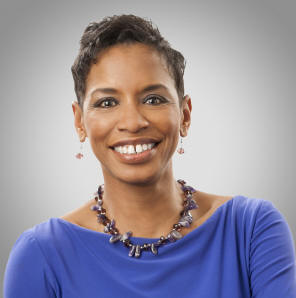Donna Edwards Is One Of Us
An interview with Maryland's first black congresswoman
Doreen St. Felix
Originally published in Lenny Letter
 Donna Edwards has a flare for oration. When I arrive at her Maryland campaign headquarters in late summer 2015, Edwards's team — enthusiastic, spritely; no one looks much older than 30— assures me I'm in for a rich and winding conversation. The walls are tacked with handmade
posters that say "I'm on #TeamDonna." "I love stopping by her office. Mention bikes! You and Donna will talk all day," says Yasmine Evans, a 25-year-old staffer and Maryland native who has supported Congresswoman Edwards since she became Maryland's first black congresswoman, in 2008.
Donna Edwards has a flare for oration. When I arrive at her Maryland campaign headquarters in late summer 2015, Edwards's team — enthusiastic, spritely; no one looks much older than 30— assures me I'm in for a rich and winding conversation. The walls are tacked with handmade
posters that say "I'm on #TeamDonna." "I love stopping by her office. Mention bikes! You and Donna will talk all day," says Yasmine Evans, a 25-year-old staffer and Maryland native who has supported Congresswoman Edwards since she became Maryland's first black congresswoman, in 2008.
And Evans is right. Edwards, 57, and I immediately settle into a talk so familiar it is uncanny, swapping stories on the perils of fixies as easily as the perils of student debt. "I was in debt when I ran for Congress," Edwards says before adding with a wry smile, "and I still won."
Edwards's rhetorical gifts will serve her well if she becomes a senator. She's long advocated for those constituencies much of the Democratic Party has too frequently ignored. Just this past October, Edwards held the House of Representatives floor until she was cut off, naming each of the 301 Maryland citizens who died as a result of gun violence in 2015. In response to the
armed occupation of the federal Malheur National Wildlife Refuge in Oregon this winter, Edwards issued a statement calling out media outlets for biased coverage with respect to white militants compared to actions carried out by black activists. For eight years, Edwards has seamlessly melded her instincts as a community activist with her platform as a representative of the fourth
district of Maryland, specifically its minority and female populations. Edwards has increased funding for math and science in elementary schools, fought against zoning laws and gerrymandering, and introduced women-centered economic policies to Maryland. Before joining Congress, Edwards served as the first director and the co-founder of the National Network to End Domestic
Violence. She was instrumental in the passage of the 1994 Violence Against Women Act.
In turn, Edwards's progressive base backs her out of a loyalty fixed in hope rather than party-line complacency, as Edwards's political origin story informs her authenticity. Edwards is a single black mother who came to office from grassroots activism rather than as a D.C. political operative. When Edwards announced her bid for Senate in early 2015, national organizations like
EMILY's List and the Progressive Change Campaign Committee came out in unilateral support. Adam Green of the PCCC said in the organization's endorsement: "Donna Edwards has proven time and again that she's a bold progressive. She's not just an ally — she's one of us."
Currently, there are no black women serving in the U.S. Senate. If Congresswoman Edwards wins, she'll become the first to serve since 1998, becoming only the second in U.S. history. Edwards embraces the outsider role she represents among D.C. players, revels in it even, and she is prepared to use her engagement with grassroots groups to push the party toward real
progressivism.
But Edwards knows, as much as she loves her party, that it won't be easy. When I call her five months after our initial interview, as the race between her and Congressman Chris Van Hollen intensifies, Congresswoman Edwards is disarmingly blunt. "The political establishment is never going to support somebody like me because I'm responsive to ordinary working people and not to
the political class." In our interview, Edwards talks about the need for progressivism within the party, Black Lives Matter, gun violence, and the example Baltimore can set for the rest of America.